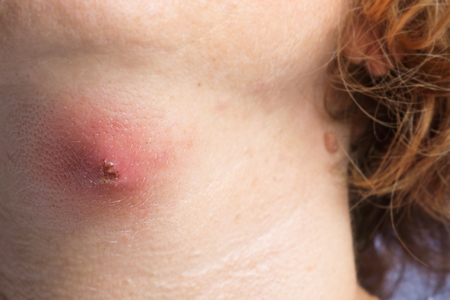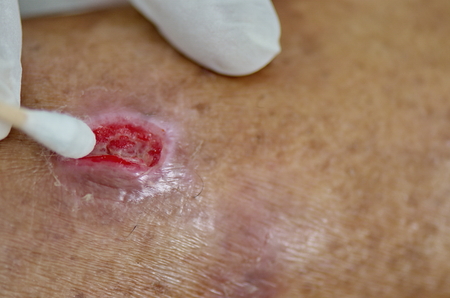Symptoms, remedies, treatments and care for Abscess
Abscess
 Abscess is a collection of pus that has built up within the tissue of the body. Pus is a thick fluid that usually contains white blood cells, dead tissue and bacteria. The pus may be yellow or green and may have a bad smell. Signs and symptoms of abscesses include redness, pain, warmth, and swelling. The swelling may feel fluid filled when pressed. The area of redness often extends beyond the swelling.
Abscess is a collection of pus that has built up within the tissue of the body. Pus is a thick fluid that usually contains white blood cells, dead tissue and bacteria. The pus may be yellow or green and may have a bad smell. Signs and symptoms of abscesses include redness, pain, warmth, and swelling. The swelling may feel fluid filled when pressed. The area of redness often extends beyond the swelling.Abscesses can develop at various parts of your body. The most common sites on the skin include your armpits (axillae), areas around your anus and vagina (Bartholin gland abscess), the base of your spine (pilonidal abscess), around a tooth (dental abscess), and in your groin. Inflammation around a hair follicle can also lead to the formation of an abscess, which is called a boil (furuncle). A severe or large cluster of boils is called carbuncle.
Abscesses are usually caused by bacterial infection. When our normal skin barrier is broken, even from minor trauma, bacteria can enter the skin. In the US and many other areas of the world they are usually caused by methicillin-resistant Staphylococcus aureus and Streptococcus pyogenes. Some abscesses can be caused by parasites, but these are more common in the developing world. A major risk factor for developing skin abscesses is a weak immune system (either from chronic diseases or from medications), because the body's ability to fight infection is decreased. Other risk factors include exposure to dirty environments or other people with infections, poor personal hygiene and poor circulation.
For larger or persistent skin abscesses, your doctor may prescribe a course of antibiotics to help clear the infection and prevent it from spreading. The pus may also need to be drained to clear the infection. If a skin abscess isn't drained, it may continue to grow and fill with pus until it bursts, which can be very painful and can cause the infection to spread or recur. If your skin abscess needs draining, you'll probably have a small operation carried out under a local anaesthetic. During the procedure, the surgeon makes a incision (cut) in the abscess, to allow the pus to drain out.
Remedies:
3.6



 (123)
(123)



 (123)
(123)
Effectiveness: 3.6 Popularity: 123
1.3

 (119)
(119)

 (119)
(119)
Effectiveness: 1.3 Popularity: 119
3.6



 (103)
(103)



 (103)
(103)
Effectiveness: 3.6 Popularity: 103
3.8



 (95)
(95)



 (95)
(95)
Effectiveness: 3.8 Popularity: 95
2.3


 (86)
(86)


 (86)
(86)
Effectiveness: 2.3 Popularity: 86
0.6
 (79)
(79)
 (79)
(79)
Effectiveness: 0.6 Popularity: 79
3.3



 (76)
(76)



 (76)
(76)
Effectiveness: 3.3 Popularity: 76
3.5



 (64)
(64)



 (64)
(64)
Effectiveness: 3.5 Popularity: 64
4.0



 (43)
(43)



 (43)
(43)
Effectiveness: 4.0 Popularity: 43
2.2


 (34)
(34)


 (34)
(34)
Effectiveness: 2.2 Popularity: 34
0.7
 (29)
(29)
 (29)
(29)
Effectiveness: 0.7 Popularity: 29
3.0


 (23)
(23)


 (23)
(23)
Effectiveness: 3.0 Popularity: 23
4.0



 (17)
(17)



 (17)
(17)
Effectiveness: 4.0 Popularity: 17
0.4
 (15)
(15)
 (15)
(15)
Effectiveness: 0.4 Popularity: 15
3.0


 (9)
(9)


 (9)
(9)
Effectiveness: 3.0 Popularity: 9
1.0
 (2)
(2)
 (2)
(2)
Effectiveness: 1.0 Popularity: 2
3.0


 (1)
(1)


 (1)
(1)
Effectiveness: 3.0 Popularity: 1
1.0
 (1)
(1)
 (1)
(1)
Effectiveness: 1.0 Popularity: 1
Effectiveness: N/A Popularity: 0
Boil
 Boil, a.k.a. skin abscess is a painful, pus-filled bump under the skin caused by infected, inflamed hair follicles. A boil that occurs on the eyelid is called a stye. The skin is an essential part of our immune defense against materials and microbes that are foreign to our body. Any break in the skin, such as a cut or scrape, can develop into an abscess (boil) should it then become infected with bacteria.
Boil, a.k.a. skin abscess is a painful, pus-filled bump under the skin caused by infected, inflamed hair follicles. A boil that occurs on the eyelid is called a stye. The skin is an essential part of our immune defense against materials and microbes that are foreign to our body. Any break in the skin, such as a cut or scrape, can develop into an abscess (boil) should it then become infected with bacteria.An active skin boil is contagious. The infection can spread to other parts of the person's body or to other people through skin-to-skin contact or the sharing of personal items.
Remedies:
3.0


 (117)
(117)


 (117)
(117)
Effectiveness: 3.0 Popularity: 117
3.2



 (115)
(115)



 (115)
(115)
Effectiveness: 3.2 Popularity: 115
3.0


 (101)
(101)


 (101)
(101)
Effectiveness: 3.0 Popularity: 101
2.6


 (86)
(86)


 (86)
(86)
Effectiveness: 2.6 Popularity: 86
0.8
 (86)
(86)
 (86)
(86)
Effectiveness: 0.8 Popularity: 86
3.3



 (71)
(71)



 (71)
(71)
Effectiveness: 3.3 Popularity: 71
0.4
 (57)
(57)
 (57)
(57)
Effectiveness: 0.4 Popularity: 57
3.2



 (55)
(55)



 (55)
(55)
Effectiveness: 3.2 Popularity: 55
0.4
 (33)
(33)
 (33)
(33)
Effectiveness: 0.4 Popularity: 33
3.2



 (31)
(31)



 (31)
(31)
Effectiveness: 3.2 Popularity: 31
1.3

 (10)
(10)

 (10)
(10)
Effectiveness: 1.3 Popularity: 10
3.1



 (9)
(9)



 (9)
(9)
Effectiveness: 3.1 Popularity: 9
3.0


 (6)
(6)


 (6)
(6)
Effectiveness: 3.0 Popularity: 6
2.7


 (6)
(6)


 (6)
(6)
Effectiveness: 2.7 Popularity: 6
2.5


 (6)
(6)


 (6)
(6)
Effectiveness: 2.5 Popularity: 6
2.0

 (2)
(2)

 (2)
(2)
Effectiveness: 2.0 Popularity: 2
1.0
 (1)
(1)
 (1)
(1)
Effectiveness: 1.0 Popularity: 1
Effectiveness: N/A Popularity: 0
Effectiveness: N/A Popularity: 0
Cannot find information on an ailment or condition? Submit it to our system